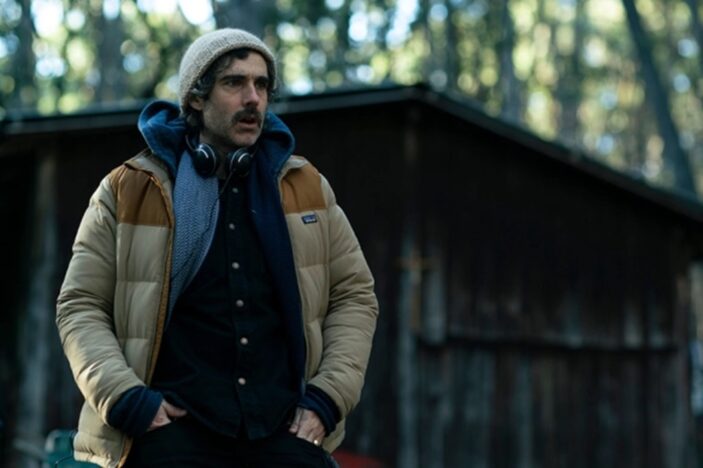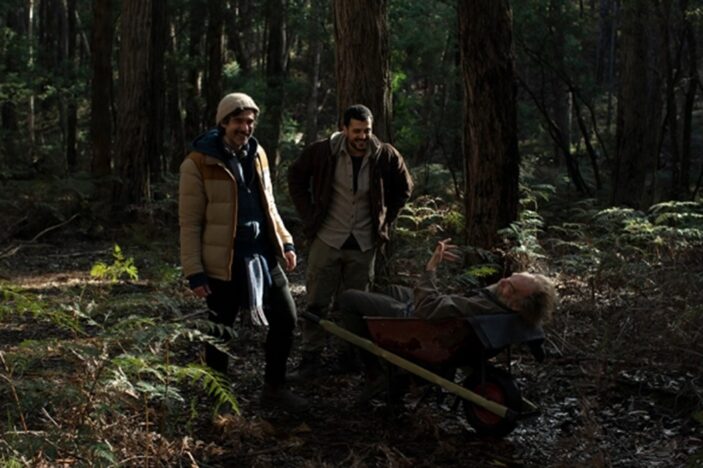
When the body of his oldest friend is found buried in a shallow grave, Dan, a small-town cop, seeks answers from a volatile Hermit who may have been the last person to see his friend alive.
Such is the plotline for Mark Leonard Winter‘s intimate, psychological drama The Rooster, which is arriving in Australian theatres this week, following a successful run at both the Melbourne International Film Festival last year and, most recently, the Santa Barbara Film Festival.
After speaking with producer Geraldine Hakewill, Peter Gray discussed with Winter how he navigated his feature film debut as a director, the importance (and terror) of riding the film on Hugo Weaving’s shoulders, and the important conversation surrounding make fragility the story is presenting.
I had the pleasure of speaking to Geraldine, and she assured me that the two of you are still together, so clearly the filmmaking experience was a success. Was there ever a concern for you in the lines of professional and personal being blurred during production?
I think the main thing was (laughs) naivety is your friend. The intensity of making something in the way we did…we had an idea, but we didn’t really know what we were in for. And to add further complication, a week before we started shooting we found out Geri was pregnant. So she was experiencing intense morning sickness, and we didn’t have a unit department, so I’m watching her kind of pulling marquees out of the back of utes and setting up our unit tables, and stuff like that, and I’m thinking, “This can’t be good.”
By far it’s the most intense thing we’ve ever done together. Also, the time span on a film is just immense, and we were both stepping into roles that we hadn’t occupied before. There was so much learning happening so quickly. But we did it. Even if we never experienced any sort of personal stuff, it’s just the pressures of what you’re trying to achieve and the difficulties of that. (Geri) was amazing, because she was some kind of horse whisperer, or something, to me. She just has this shorthand with me, and she could sense if I was feeling something, and then she could communicate my weirdness to other people and make it understandable. There was a lot of that happening.
To get a film made is such an astronomical feat on its own accord, and then to do it outside of the studio system? You’ve worked on a variety of productions and with some big directors. Was there anyone you took inspiration from? And was directing always the path you saw yourself taking?
My background is in making theatre work. With a bunch of my friends we formed these companies, and just started creating our own work. So, in a sense, my background in that sort of collaborative space led me to move into more “straighter acting”, but the great thing about being an actor in film or television is that you get to walk on to so many people’s sets. If you’re a director, at best, you’re walking on set maybe once or twice every two years. And that’s if things are going really well. You know, whereas an actor you get to experience how a Baz Luhrmann or a Jane Campion runs something. You slowly start to collect little bits of information
It was a big step moving into directing, but I felt like I had something I really wanted to explore that I really wanted to talk about. A few years ago I was going through a really difficult time in my life, and I know a lot of people battle their brains at times, men and women, but I feel like men in Australia have a really difficult time being able to talk about it, and being able to find the words to begin to understand what’s happening. When you’re in that place there’s a lot of shame. A lot of self hate. A lot of self violence. And you don’t want to burden the people in your life that you love. I also found that if you’re lucky enough to survive, which a lot of people don’t, which is awful, you sort of look back and think, “Did it ever happen?”
(The Rooster) is sort of what I couldn’t say, and I tried to make something that has meaning. I wanted a beautiful response to that vacuum, you know? That’s what I set out to do.
A lot of what you said really resonated with me. I had my own battles with depression and thoughts I’d never entertained before, and it’s so true that you look back and it seems almost like an out-of-body experience.
Yeah, it’s been really fascinating for me sharing this film. What you were describing is something I’m encountering with people after seeing the film. There’s this deeper appreciation, or a kind of fellow traveller in that space. So many of us men feel like we’re never going to get out. So it was important for me with (The Rooster) to show there is a path. I also think it was interesting having the main character as a cop, because our relationship with cops on screen is usually one of heroism. It’s saving the girl, or stopping the bank heist, or whatever…whereas this is such a quieter achievement. It’s just that continuation of survival.

And I understand Hugo Weaving was always who you had in mind for the role of Hermit? Geraldine was saying him coming on board very much helped the film find its footing. Is there ever a worry in handing over a script to someone you know so well and awaiting their response?
Oh, man, it’s every phase of sheer terror! Shooting was great fun. The set was really joyous and full of camaraderie and bravery and playfulness. But when you sit in your room writing this thing, which you’ve never really done before, and you’re hitting send to Hugo Weaving’s email…you’re just in terror. And when he comes back with, “Hey, this is really interesting. I like this part. Keep me posted.” There’s this encouraging sense he has, but it’s still very scary.
Hugo is a really gentle, beautiful soul, and watching him just take that step into the character…you know, this is an independent film where we’re having lunch in my garage. There’s no trailers, and he would sneak off to the shack to nap at lunchtime. Like, he’s Hugo Weaving! He doesn’t have to do this. He doesn’t have to take that risk with an unknown filmmaker. Yes, he’s worked with me as an actor, but it’s a risky thing. But the film wouldn’t exist without him.
He really did produce something so raw and beautiful and funny, but, along with Phoenix (Raei), just watching these two in tandem was a dream. But we would not be having this conversation without Hugo. But he has a true belief in Australian cinema, and the Australian voice, and the importance of that. It’s genuine. He’s not doing that with one eye over looking at America. He believes in this nation’s cultural voice.
Well, as much as Hugo got the film made, it still wouldn’t exist without your vision. This is still a testament to you as a director. And to have the film secure a theatrical release too? We love seeing that type of support.
Thanks, man. Yeah, I’m just blown away. To have our little movie (out), I just hope we get people talking about it so that more people can find out about it. That’s all we can really hope for. That’s my little prayer for it.
The Rooster is screening in Australian theatres from February 22nd, 2024.
